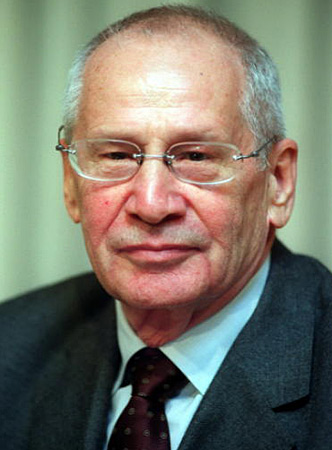
Markus Johannes "Mischa" Wolf (January 19, 1923 – November 9, 2006) was head of the General Reconnaissance Administration, the foreign intelligence division of East Germany's Ministry for State Security (MfS). He was the MfS's number two for 34 years, which spanned most of the Cold War.
Born in Hechingen, Province of Hohenzollern (now Baden-Württemberg), Wolf was the son of the writer and physician Friedrich Wolf and brother of film director Konrad Wolf. His father was a member of the Communist Party of Germany, and after Adolf Hitler gained power, they emigrated via Switzerland and France to Moscow because of their Communist conviction and their Jewish ancestry.
During his exile, he first attended the German Karl Liebknecht Schule and later a Russian school. Afterwards, he entered the Moscow Institute of Airplane Engineering (Moscow Aviation Institute), which was evacuated to Alma Ata after Germany's attack on the Soviet Union. There he was told to join the Comintern, where he among others was prepared for undercover work behind enemy lines.
After the end of the war, he was sent to Berlin with the group around Walter Ulbricht to work as a journalist for a radio station in the Soviet Zone of occupation. He was among those journalists who observed the entire Nuremberg Trials against the principal Nazi leaders.
In 1953, at the age of 30, he was among the founding members of the foreign intelligence service within the ministry of state security. As intelligence chief, Wolf achieved great success in penetrating the government, political and business circles of West Germany with spies. The most influential case was that of Günter Guillaume that led to the fall of chancellor Willy Brandt. For most of his career, he was known as "the man without a face" due to his elusiveness. It was reported that Western agencies did not know what the East German spy chief looked like until 1978, when he was photographed during a visit to Sweden by Säpo, Sweden's National Security Service. An East German defector, Werner Stiller, then identified Wolf to West German counterintelligence as the man in the picture. This was largely untrue, however, with elements within the CIA having identified him from photos of attendees at the Nuremberg trials by 1959.
He retired in 1986 in order to continue the work of his late brother Konrad in writing the story of their upbringing in Moscow in the 1930s. The book Troika came out on the same day in East and West Germany. For the people in the East he was a symbol of the ongoing changes, because he supported the glasnost and perestroika policies of Mikhail Gorbachev. His successor as head of intelligence was Werner Großmann.
Shortly before German reunification he fled the country, and sought political asylum in Russia and Austria. When denied, he returned to Germany where he was arrested by German police. Wolf claimed to have refused an offer of "seven figures", a new identity and a home in California from the Central Intelligence Agency to defect to the United States. In 1993 he was convicted of treason by Oberlandesgericht Düsseldorf and sentenced to six years imprisonment. This was later quashed by the Federal Criminal Court because Wolf was acting from the territory of the then-independent GDR. In 1997 he was convicted of unlawful detention, coercion, and bodily harm, and was given a suspended sentence of two years imprisonment. He was additionally sentenced to three days' imprisonment for refusing to testify against Paul Gerhard Flämig. when the former West German (SPD) politician was accused in 1993 of atomic espionage. Wolf said that Flämig was not the agent that he had mentioned in his memoirs: Flämig had unwittingly been probed by intelligence agents during authorised discussions in the GDR.
Markus Wolf died in his sleep at his Berlin home on November 9, 2006.